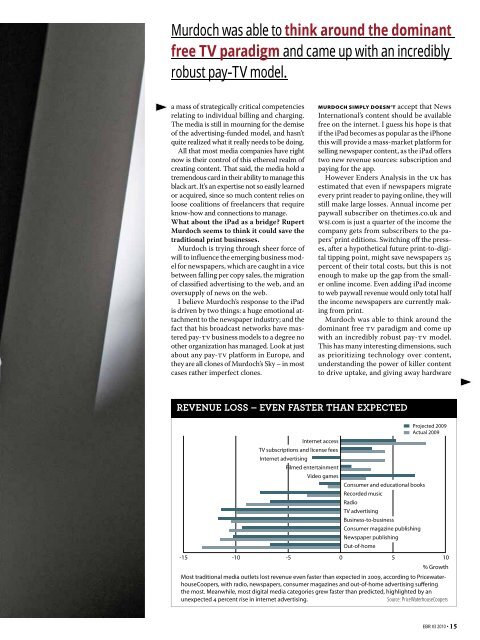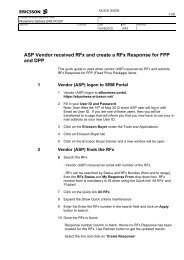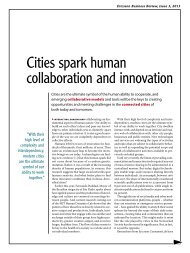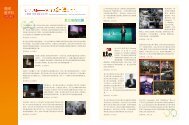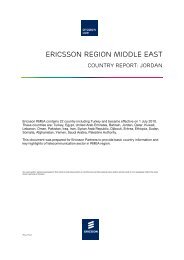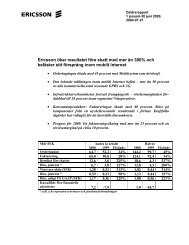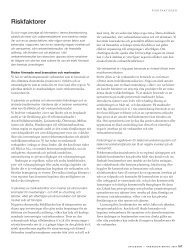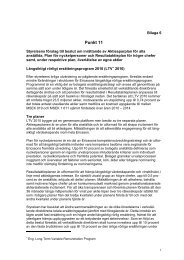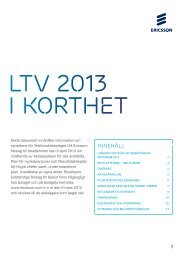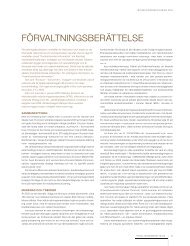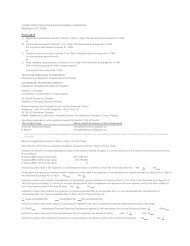Telenor's - Ericsson
Telenor's - Ericsson
Telenor's - Ericsson
- TAGS
- ericsson
- www.ericsson.com
You also want an ePaper? Increase the reach of your titles
YUMPU automatically turns print PDFs into web optimized ePapers that Google loves.
Murdoch was able to think around the dominant<br />
free TV paradigm and came up with an incredibly<br />
robust pay-TV model.<br />
a mass of strategically critical competencies<br />
relating to individual billing and charging.<br />
The media is still in mourning for the demise<br />
of the advertising-funded model, and hasn’t<br />
quite realized what it really needs to be doing.<br />
All that most media companies have right<br />
now is their control of this ethereal realm of<br />
creating content. That said, the media hold a<br />
tremendous card in their ability to manage this<br />
black art. It’s an expertise not so easily learned<br />
or acquired, since so much content relies on<br />
loose coalitions of freelancers that require<br />
know-how and connections to manage.<br />
What about the iPad as a bridge? Rupert<br />
Murdoch seems to think it could save the<br />
traditional print businesses.<br />
Murdoch is trying through sheer force of<br />
will to influence the emerging business model<br />
for newspapers, which are caught in a vice<br />
between falling per copy sales, the migration<br />
of classified advertising to the web, and an<br />
oversupply of news on the web.<br />
I believe Murdoch’s response to the iPad<br />
is driven by two things: a huge emotional attachment<br />
to the newspaper industry; and the<br />
fact that his broadcast networks have mastered<br />
pay-tv business models to a degree no<br />
other organization has managed. Look at just<br />
about any pay-tv platform in Europe, and<br />
they are all clones of Murdoch’s Sky – in most<br />
cases rather imperfect clones.<br />
MURDOCH SIMPLY DOESN’T accept that News<br />
International’s content should be available<br />
free on the internet. I guess his hope is that<br />
if the iPad becomes as popular as the iPhone<br />
this will provide a mass-market platform for<br />
selling newspaper content, as the iPad offers<br />
two new revenue sources: subscription and<br />
paying for the app.<br />
However Enders Analysis in the uk has<br />
estimated that even if newspapers migrate<br />
every print reader to paying online, they will<br />
still make large losses. Annual income per<br />
paywall subscriber on thetimes.co.uk and<br />
wsj.com is just a quarter of the income the<br />
company gets from subscribers to the papers’<br />
print editions. Switching off the presses,<br />
after a hypothetical future print-to-digital<br />
tipping point, might save newspapers 25<br />
percent of their total costs, but this is not<br />
enough to make up the gap from the smaller<br />
online income. Even adding iPad income<br />
to web paywall revenue would only total half<br />
the income newspapers are currently making<br />
from print.<br />
Murdoch was able to think around the<br />
dominant free tv paradigm and come up<br />
with an incredibly robust pay-tv model.<br />
This has many interesting dimensions, such<br />
as prioritizing technology over content,<br />
understanding the power of killer content<br />
to drive uptake, and giving away hardware<br />
REVENUE LOSS – EVEN FASTER THAN EXPECTED<br />
Projected 2009<br />
Actual 2009<br />
Internet access<br />
TV subscriptions and license fees<br />
Internet advertising<br />
Filmed entertainment<br />
Video games<br />
Consumer and educational books<br />
Recorded music<br />
Radio<br />
TV advertising<br />
Business-to-business<br />
Consumer magazine publishing<br />
Newspaper publishing<br />
Out-of-home<br />
-15 -10 -5 0 5 10<br />
% Growth<br />
Most traditional media outlets lost revenue even faster than expected in 2009, according to PricewaterhouseCoopers,<br />
with radio, newspapers, consumer magazines and out-of-home advertising suff ering<br />
the most. Meanwhile, most digital media categories grew faster than predicted, highlighted by an<br />
unexpected 4 percent rise in internet advertising. Source: PriceWaterhouseCoopers<br />
EBR #3 2010 15


